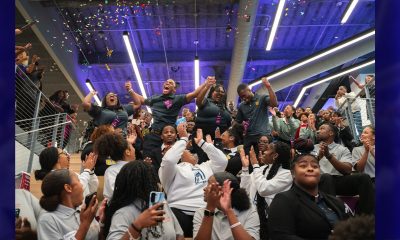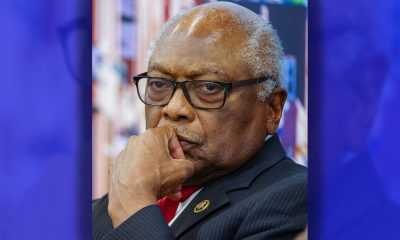National
New Congressional Caucus Champions HBCUs

Representative Alma Adams (D-N.C.), shown here, partnered with Bradley Byrne (R-Ala.) to launch the Bipartisan Congressional HBCU Caucus. (Courtesy Photo)
By Jazelle Hunt
NNPA Washington Correspondent
WASHINGTON (NNPA) – A little help may be on the way for historically Black colleges and universities struggling against falling financial support and an increasingly skeptical public.
The Bipartisan Congressional HBCU Caucus was launched last week, with Congressional members Representatives Alma Adams (D-N.C.) and Bradley Byrne (R-Ala.) at the helm. Its 45 members and counting are charged with safeguarding the interests of historically Black colleges and universities, supporting students and graduates; creating a national dialogue; and educating other members of Congress on the value of these institutions.
“This bipartisan HBCU Caucus is bringing together champions for HBCUs, so that we can make an even bigger impact to ensure their needs are heard in every aspect of policy making and across party lines,” said Rep. Adams, creator and co-chair of the caucus, alumna of North Carolina A&T State University, and former administrator at her alma mater and Bennett College, both in Greensboro, N.C.
“[HBCUs] do what no other schools do for students like me, a poor Black girl from Newark, New Jersey who came to North Carolina – wasn’t fully prepared – but yet North Carolina took me in, got me prepared, and I was able to do what I’m doing right now.”
The caucus comes at a time when HBCUs are facing a barrage of challenges. In 2011, Congress put more funding toward need-based Pell grants, but lowered the cap to 12 semesters (or six school years) instead of the previous 18. Non-traditional students, such as parents, veterans, and people beyond their early 20s, as well as low-income students who work part-time, often have complicated circumstances that make it difficult to go straight through four years of school full time. For such students, it can take several years to earn a degree.
“Many of our young people really do have to work…to pay for education. So a large majority of students we serve at our HBCUs in particular are on financial aid – several types of financial aid,” said Rep. Adams at a launch event for the Caucus. “We talk about access and affordability. You don’t have access if you don’t have the check to go with it.”
The same year, federal parent PLUS loan requirements were changed in an effort to keep financially burdened families from taking on more debt. The changes went into effect almost immediately, and thousands of previously approved parents were abruptly denied for a renewal. As a result thousands of students – largely Black, low-income, and first-generation – were forced to pause or delay their college educations. According to data from the National Association of Student Financial Aid Administrators, enrollment at HBCUs fell 3.4 percent for fall 2012. The number of students with PLUS loans fell 46 percent, and HBCUs saw a 36 percent decrease in the awarded dollar amounts. That meant fewer students able to continue college, and less revenue for the schools.
The Obama administration has corrected this oversight, but the damage has been done.
“Our parents spend much more money on educating their children than White families do. That’s just a fact, if you look at percentage of income,” said caucus member Rep. James E. Clyburn (D-SC) at the same event. “We’re talking about good students who need an opportunity, who need to go into an environment that’s nurturing. So we are going to have to fight for these HBCUs.”
There is also less aid available for institutions. According to a 2014 report from the Center on Budget and Policy Priorities, state schools now rely on students fees and tuition for 48 percent of their revenues, compared to 24 percent in 1988. Of the nation’s 105 HBCUs, nearly half are state schools. Meanwhile, Texas, North Carolina, South Carolina, West Virginia, Virginia, Arkansas, Kentucky, Missouri, Florida, and Delaware were all caught withholding state funds specifically from their HBCUs.
The Department of Education shells out roughly $300 million for Black schools each year. But this funding, like all federal money, can change without warning from year to year. Howard University, for example, is a private school, but has historically had its own line in the budget that serves as a critical source of funding. In 2012, this funding was cut by more than $12 million, and has remained at that amount each year since.
The Obama administration has attempted to work around the financial squeeze by awarding of grants and contracts to HBCUs through the White House Initiative on HBCUs, but some reports state that the amount of these awards is also on the decline.
President Obama’s America’s College Promise comes on the heels of these blows. The proposal offers the first two years of community college free for students who attend consistently and at least part-time, and maintain a 2.5 GPA. However, HBCUs and community colleges have always competed for non-traditional students, as well as students who need extra instruction or assistance to get acclimated and succeed in college. With this proposal and slim chances for HBCUs to match the offer, community colleges may be a more attractive choice.
“Anybody that tells you that these schools aren’t needed, ask them what is happening on the other end of the spectrum, when we are getting rid of affirmative action admissions policies, we’re getting rid of various formulae that’s used to fund schools, and then you want to close down HBCUs,” said Rep. Clyburn. “It means we are on track to creating a permanent underclass in this country.”
Despite these challenges, HBCUs still manage to produce crucial results.
Despite serving just 3 percent of the nation’s college students, the 107 HBCUs graduate nearly 20 percent of African Americans who earn undergraduate degrees and more than 50 percent of African American professionals and public school teachers.
“HBCUs have long been an important part of our nation’s higher education system,” said Rep. Byrne, co-chair of the caucus. “HBCUs deal with many of the same challenges as other higher education institutions, but they also face unique obstacles that demand special attention. Our nation’s HBCUs are evolving as they adapt to a changing workforce, and through this caucus, I look forward to helping guide the conversation about how we can best support our nation’s HBCUs.”
Follow Jazelle Hunt on Twitter at @JazelleAH.
Activism
Oakland Post: Week of April 17 – 23, 2024
The printed Weekly Edition of the Oakland Post: Week of April 17 – 23, 2024

To enlarge your view of this issue, use the slider, magnifying glass icon or full page icon in the lower right corner of the browser window. ![]()
Barbara Lee
Congresswoman Barbara Lee Issues Statement on Deaths of Humanitarian Aid Volunteers in Gaza
On April 2, a day after an Israeli airstrike erroneously killed seven employees of World Central Kitchen (WCK), a humanitarian organization delivering aid in the Gaza Strip, a statement was release by Rep. Barbara Lee (D-CA-12). “This is a devastating and avoidable tragedy. My prayers go to the families and loved ones of the selfless members of the World Central Kitchen team whose lives were lost,” said Lee.

By California Black Media
On April 2, a day after an Israeli airstrike erroneously killed seven employees of World Central Kitchen (WCK), a humanitarian organization delivering aid in the Gaza Strip, a statement was release by Rep. Barbara Lee (D-CA-12).
“This is a devastating and avoidable tragedy. My prayers go to the families and loved ones of the selfless members of the World Central Kitchen team whose lives were lost,” said Lee.
The same day, it was confirmed by the organization that the humanitarian aid volunteers were killed in a strike carried out by Israel Defense Forces (IDF). Prior to the incident, members of the team had been travelling in two armored vehicles marked with the WCF logo and they had been coordinating their movements with the IDF. The group had successfully delivered 10 tons of humanitarian food in a deconflicted zone when its convoy was struck.
“This is not only an attack against WCK. This is an attack on humanitarian organizations showing up in the direst situations where food is being used as a weapon of war. This is unforgivable,” said Erin Gore, chief executive officer of World Central Kitchen.
The seven victims included a U.S. citizen as well as others from Australia, Poland, the United Kingdom, Canada, and Palestine.
Lee has been a vocal advocate for a ceasefire in Gaza and has supported actions by President Joe Biden to airdrop humanitarian aid in the area.
“Far too many civilians have lost their lives as a result of Benjamin Netanyahu’s reprehensible military offensive. The U.S. must join with our allies and demand an immediate, permanent ceasefire – it’s long overdue,” Lee said.
Commentary
Commentary: Republican Votes Are Threatening American Democracy
In many ways, it was great that the Iowa Caucuses were on the same day as Martin Luther King Jr. Day. We needed to know the blunt truth. The takeaway message after the Iowa Caucuses where Donald Trump finished more than 30 points in front of Florida Gov. De Santis and former South Carolina Governor Nikki Haley boils down to this: Our democracy is threatened, for real.

By Emil Guillermo
In many ways, it was great that the Iowa Caucuses were on the same day as Martin Luther King Jr. Day.
We needed to know the blunt truth.
The takeaway message after the Iowa Caucuses where Donald Trump finished more than 30 points in front of Florida Gov. De Santis and former South Carolina Governor Nikki Haley boils down to this: Our democracy is threatened, for real.
And to save it will require all hands on deck.
It was strange for Iowans to caucus on MLK day. It had a self-cancelling effect. The day that honored America’s civil rights and anti-discrimination hero was negated by evening.
That’s when one of the least diverse states in the nation let the world know that white Americans absolutely love Donald Trump. No ifs, ands or buts.
No man is above the law? To the majority of his supporters, it seems Trump is.
It’s an anti-democracy loyalty that has spread like a political virus.
No matter what he does, Trump’s their guy. Trump received 51% of caucus-goers votes to beat Florida Gov. Ron DeSantis, who garnered 21.2%, and former South Carolina Gov. Nikki Haley, who got 19.1%.
The Asian flash in the pan Vivek Ramaswamy finished way behind and dropped out. Perhaps to get in the VP line. Don’t count on it.
According to CNN’s entrance polls, when caucus-goers were asked if they were a part of the “MAGA movement,” nearly half — 46% — said yes. More revealing: “Do you think Biden legitimately won in 2020?”
Only 29% said “yes.”
That means an overwhelming 66% said “no,” thus showing the deep roots in Iowa of the “Big Lie,” the belief in a falsehood that Trump was a victim of election theft.
Even more revealing and posing a direct threat to our democracy was the question of whether Trump was fit for the presidency, even if convicted of a crime.
Sixty-five percent said “yes.”
Who says that about anyone of color indicted on 91 criminal felony counts?
Would a BIPOC executive found liable for business fraud in civil court be given a pass?
How about a BIPOC person found liable for sexual assault?
Iowans have debased the phrase, “no man is above the law.” It’s a mindset that would vote in an American dictatorship.
Compare Iowa with voters in Asia last weekend. Taiwan rejected threats from authoritarian Beijing and elected pro-democracy Taiwanese vice president Lai Ching-te as its new president.
Meanwhile, in our country, which supposedly knows a thing or two about democracy, the Iowa caucuses show how Americans feel about authoritarianism.
Some Americans actually like it even more than the Constitution allows.
About the Author
Emil Guillermo is a journalist and commentator. He does a mini-talk show on YouTube.com/@emilamok1.
-

 Activism4 weeks ago
Activism4 weeks agoOakland Post: Week of March 27 – April 2, 2024
-

 #NNPA BlackPress4 weeks ago
#NNPA BlackPress4 weeks agoCOMMENTARY: D.C. Crime Bill Fails to Address Root Causes of Violence and Incarceration
-

 #NNPA BlackPress4 weeks ago
#NNPA BlackPress4 weeks agoFrom Raids to Revelations: The Dark Turn in Sean ‘Diddy’ Combs’ Saga
-

 #NNPA BlackPress4 weeks ago
#NNPA BlackPress4 weeks agoCOMMENTARY: Lady Day and The Lights!
-

 #NNPA BlackPress4 weeks ago
#NNPA BlackPress4 weeks agoMayor, City Council President React to May 31 Closing of Birmingham-Southern College
-

 #NNPA BlackPress4 weeks ago
#NNPA BlackPress4 weeks agoBaltimore Key Bridge Catastrophe: A City’s Heartbreak and a Nation’s Alarm
-

 #NNPA BlackPress4 weeks ago
#NNPA BlackPress4 weeks agoBaltimore’s Key Bridge Struck by Ship, Collapses into Water
-

 #NNPA BlackPress4 weeks ago
#NNPA BlackPress4 weeks agoBeloved Actor and Activist Louis Cameron Gossett Jr. Dies at 87




















































